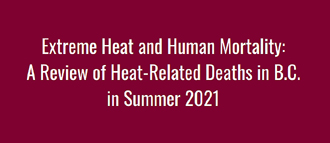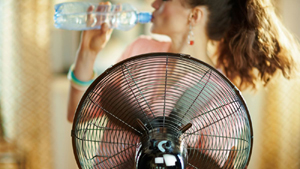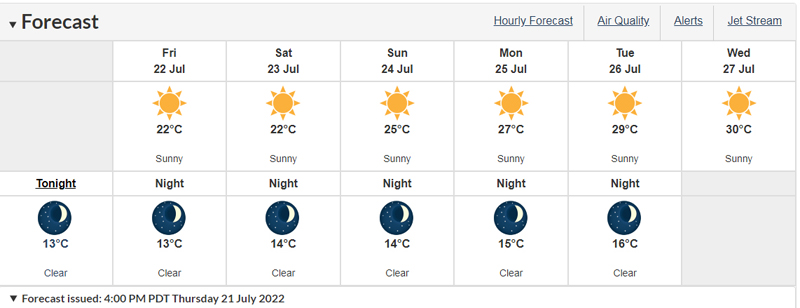Thursday July 21, 2022 | VICTORIA, BC
by Mary P Brooke | Island Social Trends
It’s a warning about heat, but it’s not quite the heat dome that southern BC experienced last summer.
“British Columbians can expect higher temperatures as a high-pressure ridge is moving into B.C. and may result in heat warnings this weekend or early next week,” it was stated in a news release two days ago.
Hot and dry weather for many parts of British Columbia is predicted by Environment and Climate Change Canada for the end of this week (starting around Friday July 22) through the weekend, into early next week (week of July 25).
“While the current forecast suggests a dip in daytime high temperatures late this week, there is potential for the high-pressure ridge to ramp up this weekend and into next week, which may lead to higher temperatures.”
Not a heat dome:
B.C. is not currently anticipating an extreme heat emergency. People are encouraged to monitor Environment and Climate Change Canada for temperature forecasts in their region.

Night time temperatures will be cooler than daytime, which is good for the human body to cool down. That was not the case in the June 2021 heat dome.
Last year’s heat dome for five days at the end of June resulted in the heat-related deaths of over 600 people in BC, mostly people living without air conditioners or fans, the elderly, and people with underlying health conditions (such as heart, lung and diabetes).
Have a heat plan:
A higher risk of heat-related illness is associated with increasing temperatures and it is critical people have a heat plan to keep safe.
A heat plan should identify cool zones inside and outside of homes (such as community centres and libraries), ways to cool down (such as taking cool baths or showers and drinking plenty of water), and identify vulnerable family members and neighbours who are susceptible to heat and should be checked on.
Symptoms of heat illness:
- Heat illnesses include heat stroke, heat exhaustion, heat fainting, heat edema (swelling of hands, feet and ankles), heat rash and heat cramps (muscle cramps).
- People should watch for symptoms such as dizziness or fainting, nausea or vomiting, confusion, headache, rapid breathing and heartbeat, extreme thirst, and decreased urination with unusually dark yellow urine.
- If someone experiences any of these symptoms during extreme heat, they should immediately move to a cool place, start cooling down and drink liquids.
- If symptoms are not mild, last longer than one hour, change, worsen or cause concern, immediately contact a health-care provider.
Be careful in lakes and rivers:
Although heat is expected, bodies of water remain cool for this time of year and may pose a risk of hypothermia to people exposed to cold water for a prolonged period. People should also be cautious when near high or fast rivers and lakes.
Extreme Heat Preparedness Guide | Heat Alert and Response System:
The Province released an Extreme Heat Preparedness Guide in June to help people prepare for extreme heat with tips about how to stay safe when temperatures rise. The guide is available in French, Punjabi, traditional Chinese and simplified Chinese.
In June, the Province announced the BC Heat Alert and Response System to establish temperature ranges and actions taken by government and communities under heat warnings and extreme heat emergencies.
Cooling:
You may wish to run your air conditioner or fans in hot weather. Keep windows, drapes and blinds closed during the heat of the day, then open them for a breeze in the evening.
Drink plenty of water, choosing to do that before you feel thirsty.
Wear a hat outdoors, and choose to be in the shade when you can.
If there is a heat warning, communities may open a cooling centre. Please check with your First Nation or local government for the most up-to-date information.
===== RELATED:
BC launches preparedness plan for heat events (June 8, 2022)
BC Coroners report on extreme heat deaths dedicated to the victims (June 7, 2022)
Meteorologist tells UBCM: heat dome was no surprise (September 15, 2021)
Smoky air is a health hazard, but heat trumps that (July 24, 2021)
===== GOVERNMENT LINKS:
- PreparedBC’s Heat Preparedness Guide: www.preparedbc.ca/extremeheat
- Find a cooling centre near you: https://www.emergencyinfobc.gov.bc.ca/find-a-cooling-centre-near-you/
- Environment and Climate Change Canada’s weather alerts: https://weather.gc.ca/warnings/index_e.html?prov=bc
- Information about the BC Heat Alert and Response System: www.bccdc.ca/extremeheat
- Follow PreparedBC on Facebook: www.facebook.com/PreparedBC
- Follow PreparedBC on Twitter: www.twitter.com/PreparedBC
- EmergencyInfoBC: https://www.emergencyinfobc.gov.bc.ca/
Follow EmergencyInfoBC on Twitter: https://twitter.com/EmergencyInfoBC
Environment and Climate Change Canada’s heat warning criteria: https://www.canada.ca/en/environment-climate-change/services/types-weather-forecasts-use/public/criteria-alerts.html#heat







